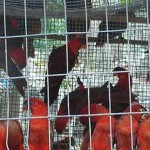Solomon Islands Deemed as the “Captive Breeding” Shenanigans
Tens of thousands of wild birds exported from the Solomon Islands have been laundered into the global wildlife trade by declaring them as captive-bred, a new TRAFFIC study has found.
Between 2000 and 2010, more than 54,000 birds, mainly parrots and cockatoos, were imported from the Solomon Islands and declared as captive bred. Yet local authorities confirmed to TRAFFIC that the Solomon Islands is not known to have substantial bird breeding facilities and registered bird breeders in the islands primarily use their facilities as holding sites for wild-caught birds bound for export.
All the birds were of species listed in the Convention on International Trade in Endangered Species of Wild Flora and Fauna (CITES), which restricts trade in wild-caught individuals, but has less stringent rules if they are captive-bred.
Native species exported included 18,444 Yellow-bibbed Lories, 15,994 Solomons Cockatoos, 8,050 Eclectus Parrots, 5,803 Cardinal Lories and 4,957 Rainbow Lorikeets. 12,820 of these birds were declared as wild-caught and 40,428 were reportedly captive-bred.
“Declaring exported birds as being captive-bred has all the hallmarks of a scam to get around international trade regulations,” said Chris R. Shepherd, Deputy Regional Director of TRAFFIC Southeast Asia and an author of the new report.
More than 13,000 non-native birds, mostly species naturally occurring in Indonesia and Papua New Guinea, were exported, yet no export records exist that could explain how any stock for captive-breeding operations had reached the Solomon Islands.
They included Critically Endangered Yellow-crested Cockatoos, which cannot be commercially traded under CITES regulations even if captive-bred, plus other threatened parrots, such as Pesquet’s Parrot, Chattering Lory, Blue-eyed Cockatoo and White Cockatoo, all claimed to be captive-bred.
The report recommends an investigation into captive breeding operations in the Solomon Islands is carried out through CITES processes. If irregularities are found, CITES ultimately has the authority to suspend all trade in CITES-listed species from the island archipelago.
Later this month, a CITES meeting takes place in Switzerland, where a report into the use of captive-breeding to circumvent CITES trade regulations is on the agenda for discussion.
